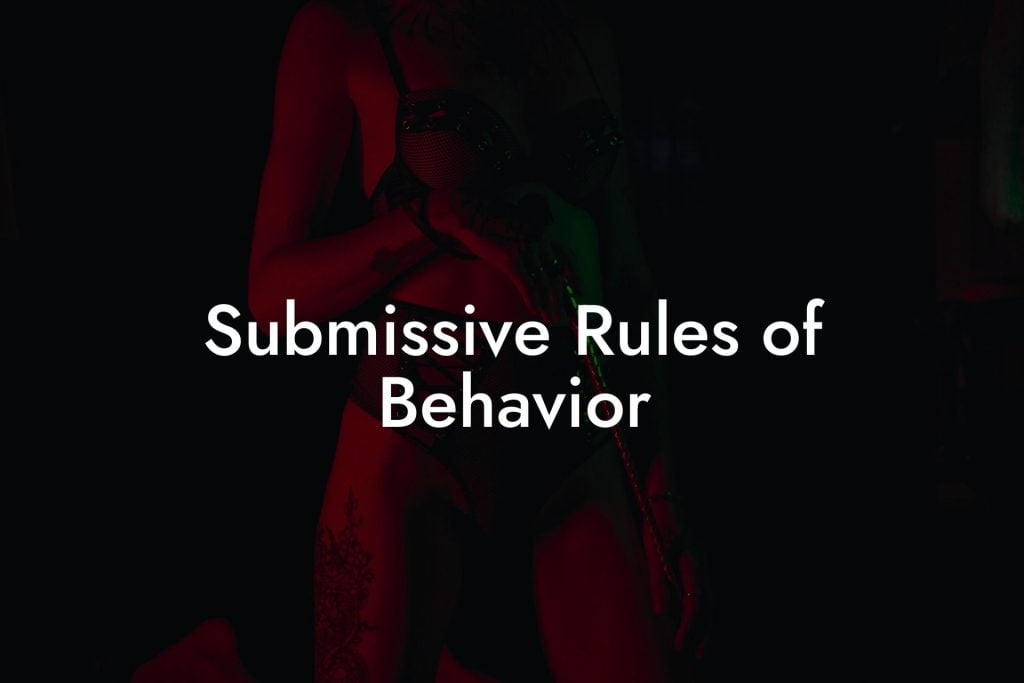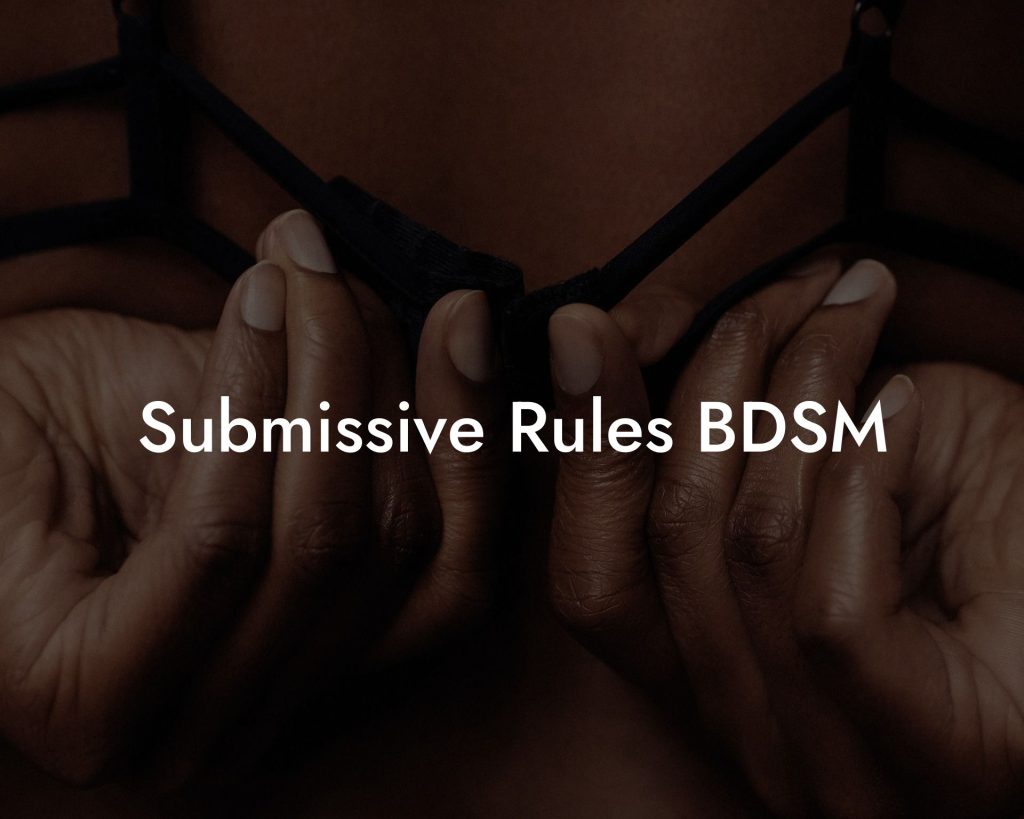Submissive Limits
In the world of BDSM, trust and clear communication are paramount. One essential aspect of this practice is setting submissive limits. Whether you are new to the BDSM scene or a seasoned player, understanding and establishing boundaries is vital for a safe and consensual experience. In this article, we will explore the importance of submissive limits, how to define them, and effective ways to communicate your boundaries.
In any BDSM relationship, consent is the cornerstone of trust and respect. It’s more than just saying “yes” or “no”—it’s about openly communicating your desires, limits, and expectations. But trust doesn’t end with a conversation—it’s built through ongoing, clear agreements. That’s where our Dominant & Submissive BDSM Contract Pack comes in. Find out more →
Setting submissive limits is crucial for maintaining a healthy power dynamic in BDSM relationships. It allows both parties to feel safe and respected while engaging in various kinky activities. Here are some essential aspects to consider when establishing your limits:
Understanding Your Boundaries
Before engaging in any BDSM activity, it is crucial to have a comprehensive understanding of your personal limits. Take time to reflect on what you are comfortable with and what you absolutely do not want to participate in. Consider both physical and psychological boundaries, and be honest with yourself about what feels right for you.
Negotiation and Consent
Once you have a clear understanding of your own boundaries, it is important to communicate them effectively with your partner. Negotiation and consent play a crucial role in BDSM, and establishing limits should be an ongoing conversation. Discuss your preferences, hard limits, and any potential triggers or sensitivities. Remember, consent can be withdrawn at any time, and both parties should always feel empowered to express their needs.
Exploring Different Limits
Setting limits does not mean limiting your experiences. BDSM offers a wide range of activities that can be tailored to fit your boundaries and desires. It is essential to have an open and honest dialogue with your partner about exploring new activities while respecting each other's limits. Consider trying out different experiences gradually and always communicate your comfort levels throughout the process.
Looking for the best BDSM & Kink OnlyFans content creators? Here is a list of 10 of our favourites:
- Best Cosplay OnlyFans - 🐱 Little Kitty Kate 👉👌 >> Link
- Best Little OnlyFans - 🧸 Katya 🙇♀️ Sun >> Link
- Best Sub OnlyFans - 🍌Hanna Banana🍌 >> Link
- Best Teen & Huge Tits OnlyFans - ❣️Anny❣️19 y.o. BUSTY student girl >> Link
- Best Tiny Tits OnlyFans - ⍣⭐️ Sofia Parker ⭐️⍣ >> Link
- Best Sub & Huge Boobs OnlyFans - Nika Huge Boobs >> Link
- Best Kink OnlyFans - Julia Pearl🐚 >> Link
- Best Fetish & Girl Next Door OnlyFans - Hillary is Wet 💦 >> Link
- Best Dirty Latina OnlyFans - Paula Flores 😈 >> Link
- Best BBW & Huge Ass OnlyFans - Naughty Hanna Zimmer 💜🎀 >> Link
Not quite what you are looking for? View the full list →
Safewords and Communication
Safewords are an essential tool in BDSM play, providing a clear signal to stop or slow down if someone is experiencing discomfort or distress. Establish a safeword system with your partner, and ensure both parties understand its purpose and significance. Effective communication is key, both verbally and non-verbally, to ensure a pleasurable and safe experience for all involved.
Frequently Asked Questions
What is a BDSM contract?
A BDSM contract is a written agreement between the participants in a BDSM activity or relationship that outlines the responsibilities, limits, and expectations of each party. It's designed to provide a clear structure for the power exchange and ensure that all activities are consensual and negotiated in advance.
Are BDSM contracts legally binding?
No, BDSM contracts are not legally binding documents. They are symbolic and represent a mutual understanding and consent between parties. However, they showcase the importance of communication and set a tone of respect and trust in BDSM relationships.
How specific should a BDSM contract be?
A BDSM contract should be as specific as possible to avoid misunderstandings. It should include details about boundaries, safe words, activities that are allowed, and any hard limits. The more detailed the contract, the safer and more enjoyable the experience will be for everyone involved.
Can a BDSM contract be modified?
Yes, a BDSM contract can and should be modified as the dynamics of the relationship or the participants' needs change. It's recommended to set periods for review and renegotiation to ensure that the contract stays up-to-date and reflective of everyone's desires and limits.
How does trust play a role in a BDSM relationship?
Trust is a foundational element in BDSM relationships. Engaging in power exchange and potentially vulnerable situations requires a deep level of trust between participants. Trust is built over time through open communication, honesty, and respect for each other's boundaries and consent.
Is consent in BDSM different from consent in other sexual contexts?
While consent is vital in all sexual contexts, BDSM often requires a heightened level of communication about consent. This may involve detailed negotiations, clear safe words or signals, and ongoing check-ins throughout an activity, due to the nature of the practices involved.
How do you negotiate a BDSM scene?
Negotiating a BDSM scene involves discussing and agreeing on different aspects before any activity takes place. Participants should communicate their desires, limits, safe words, and any other relevant information. The key is to ensure that everyone has a shared understanding and agreement before starting.
What is a safe word, and why is it important?
A safe word is a predetermined word or signal that participants in a BDSM scene can use to immediately stop the activity. It is a crucial aspect of safety because it ensures that all participants have the power to end any act if they feel uncomfortable, unsafe, or simply wish to stop for any reason.
Are there different types of power dynamics in BDSM?
Yes, there are various types of power dynamics in BDSM, including Dominant/submissive, Master/slave, Owner/pet, and more. The specific roles and the extent of power exchange are defined by the preferences and agreements between the individuals involved.
Can anyone participate in BDSM?
BDSM is an inclusive practice that anyone can explore, irrespective of gender, sexuality, or background. However, it is crucial for participants to be of legal age, aware of their own boundaries, able to give informed consent, and to approach BDSM with an open mind and respect for safety protocols.
What is aftercare, and why is it important?
Aftercare refers to the care and attention given to participants after a BDSM scene or activity. It can involve physical care, emotional comfort, or both. Aftercare is important because it helps individuals return to their everyday headspace, provides comfort, and reinforces trust and connection between partners.
Do all BDSM activities involve pain or physical restraint?
No, not all BDSM activities involve pain or physical restraint. BDSM encompasses a wide range of practices and expressions of power dynamics that can include, but are not limited to, sensual play, role-playing, and psychological control. The activities are tailored to the preferences and consent of those involved.
Is it necessary to have a BDSM contract for occasional play?
While not strictly necessary for occasional play, having a BDSM contract can still be beneficial because it encourages thorough discussions about boundaries and consent. For one-time or casual encounters, a simplified agreement or verbal negotiation may be sufficient to ensure clear communication and mutual understanding.
How can I ensure my physical safety during BDSM activities?
You can ensure your physical safety by pre-negotiating activities, setting safe words, and establishing limits. Using quality equipment and playing with knowledgeable partners who respect your boundaries and listen to your needs is also crucial. After the activity, inspect for any injuries or unusual discomfort and seek medical attention if necessary.
What should I do if my boundaries are violated during a BDSM scene?
If your boundaries are violated during a BDSM scene, it is important to stop the activity immediately using your safe word or signal. Communicate your feelings and experience with your partner once you feel ready. Serious boundary violations should be treated with great concern, and it may be necessary to reevaluate the trustworthiness of the partner and seek external support if needed.
Can BDSM have psychological impacts?
Yes, BDSM can have psychological impacts, both positive and negative. It can lead to increased self-awareness, empowerment, and stress relief. However, it could also bring up unexpected emotions or past traumas. Keeping open communication with your partner and seeking professional help if you experience negative psychological effects is essential.
What do I do if I'm interested in BDSM but my partner is not?
If you're interested in BDSM but your partner is not, open and honest communication is key. Share your curiosity and desires without pressure or expectations. There may be elements of BDSM that both of you are comfortable exploring together. If not, consider if and how your needs can be satisfied within the boundaries of your relationship.
How can I learn more about BDSM?
You can learn more about BDSM through a variety of resources such as books, workshops, online forums, and community events. It's important to learn from credible sources and, if possible, to talk to experienced practitioners. Always approach new information with critical thinking and adapt insights to your own comfort and safety levels.
Is jealousy a common issue in BDSM relationships?
Jealousy can be a common issue in any relationship, including BDSM relationships, especially if they involve multiple partners or power dynamics that evoke strong emotions. Communication and honesty about feelings are essential in managing jealousy. Setting clear boundaries and rules can also help keep jealousy in check.
What role does confidentiality play in BDSM?
Confidentiality is crucial in BDSM to protect the privacy of all participants involved. Most individuals value their discretion due to the stigma that can be associated with BDSM. Respecting confidentiality ensures that trust remains intact and that individuals can express themselves freely within the community.
Can practicing BDSM improve a relationship?
Practicing BDSM can improve a relationship if it is something that all parties are interested in exploring. It may enhance communication, deepen trust, and bring a new level of intimacy. However, like any sexual or romantic endeavor, it should be approached with mutual care, consent, and respect.
Note: The content has been generated based on the given instructions and may not align with specific brand guidelines or requirements. It is advised to review and tailor the content accordingly.













